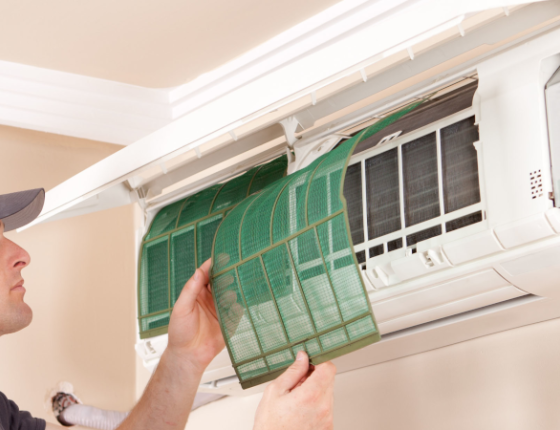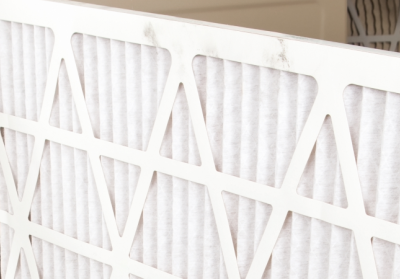Efficient Electric Heating with Air Source Heat Pumps
If you heat your home with electric, propane or heating gas, installing a cold-climate heat pump will save you money on heating.
What is an air source heat pump?
An air source heat pump (ASHP) is an electric heating and cooling system that can condition homes more efficiently than traditional propane or electric systems. Heat pumps simply move heat from one location to another. The process is similar to that of a refrigerator, except it can move heat both inside and outside. Heat pumps have been used to heat and cool homes in mild to warm climates for many years. The technology has recently become more capable and reliable for use in colder temperatures and climates like those in the upper Midwest. Units suitable for heating in our climate are appropriately called cold-climate air source heat pumps (ccASHP).
An ASHP is an energy efficient technology that can provide cooling at twice the efficiency of traditional window unit air conditioners. They can significantly reduce heating costs and have the potential to reduce cooling costs. This provides better energy savings, more comfort, and lower carbon emissions.
ASHPs are most efficient in properly weatherized homes. If you have any air sealing, insulation, or ventilation projects planned, we recommend weatherizing before you install your heat pump to have the greatest efficiency and benefits.
What are the benefits of air source heat pumps?
- Comfort. ASHPs can be a source of year-round comfort because it can cool your home during the warm months and heat your home during the cold months. Even in temperatures well below zero, heat pumps take advantage of the heat in the air. Cold-climate air source heat pumps can work in temperatures down to -13 degrees F. This means they are cost effective and reliable systems even in our extremely cold climate. With the correct settings your heat pump will keep your home comfortable during most winter days. For days colder than -13, having a backup heating system is a good idea.
- Energy savings. If you are switching to an ASHP from electric resistance heat or propane, you could save 30-55% on your heating costs. If you switch from another fuel source, like natural gas, your savings will not be as significant. In fact, some people switching from natural gas experience slight increases in monthly costs even though ASHP are so energy efficient.
- Clean energy. ASHPs are super energy efficient and result in significant CO2 reductions when compared to natural gas, propane, and electric resistance. Homeowners with existing electric heat who convert to an ASHP can decrease carbon emissions by up to 55%.
If you heat your home with natural gas, it would not be cost-efficient to replace your furnace with an air-source heat pump, since the cost of natural gas is relatively low. However, if you need to replace your air conditioner, it may be cost-effective to replace it with a heat pump (it sounds counterintuitive, but remember it can cool your home as well!) to use it to cool in the summer, and heat in the spring and fall when temperatures are milder.
Why are heat pumps more efficient than traditional fuel systems?
Even the most efficient boiler or furnace can't achieve 100% efficiency because some heat energy from combusting fuel is always lost. High efficiency heat pumps can achieve efficiencies of 400% and above, meaning for each unit of energy the heat pump uses, four or more units of heat are delivered to the home.
The main reason for this impressive cold weather performance is recent technological advancements in variable-speed, inverter-driven compressors. An inverter-driven compressor maintains a constant temperature by varying speed, or modulating, to match the heating or cooling load of the home. Think of it like cruise control in your car. You get better gas mileage when you’re cruising down the highway than in stop-and-go traffic. Traditional HVAC equipment turns on and off regularly, which is inefficient. The most efficient way to operate HVAC equipment is to keep it running, and inverter driven systems do that automatically.
Is an air source heat pump right for me and my home?
ASHPs can be installed in existing homes. They can use ductwork or small tubes to deliver conditioned air. An ASHP that does not use ductwork is often called a mini-split air source heat pump or a ductless ASHP. Between these two types of systems, ASHPs can be added to just about any home.
If your main heat source is electric resistance or propane, switching to an ASHP is a much more efficient way of heating your home. If your home uses a natural gas boiler for heat and has no central air conditioning (i.e. uses window air conditioning units), a ductless ASHP would also improve efficiency and energy savings. If your home uses a natural gas furnace, adding an ASHP to your existing ductwork is possible too. However, you may not experience the same kind of savings on your bills.
ASHPs are a great way to provide supplementary heating and cooling if the rooms in your house have large temperature swings or get uncomfortably humid. Even a basic heat pump will be more comfortable to use than a window air conditioner or space heater and will be much more efficient.
Are all heat pumps capable of heating in sub-zero temperatures?
Not all heat pumps are designed to operate below 0°F. Standard heat pumps deliver heat efficiently and effectively at temperatures down to about 20°F. Standard equipment operates the same way as cold climate equipment but doesn’t cover as much of the heating load. Depending on your needs and goals, going with standard equipment might be the best choice. These units aren’t as expensive as cold climate units but are still highly efficient and can significantly reduce energy bills.
Where can I find more information on heat pumps?
Visit the ASHP Collaborative’s homeowner resources page and their FAQ page to view heat pump buying guides, case studies, and frequently asked questions.
CEE’s Energy Advisors are available to help you find a contractor and lead you though next steps. Contact us through the “Ask Us” button below
Outside Resources

Questions about your home energy? Let's talk!



